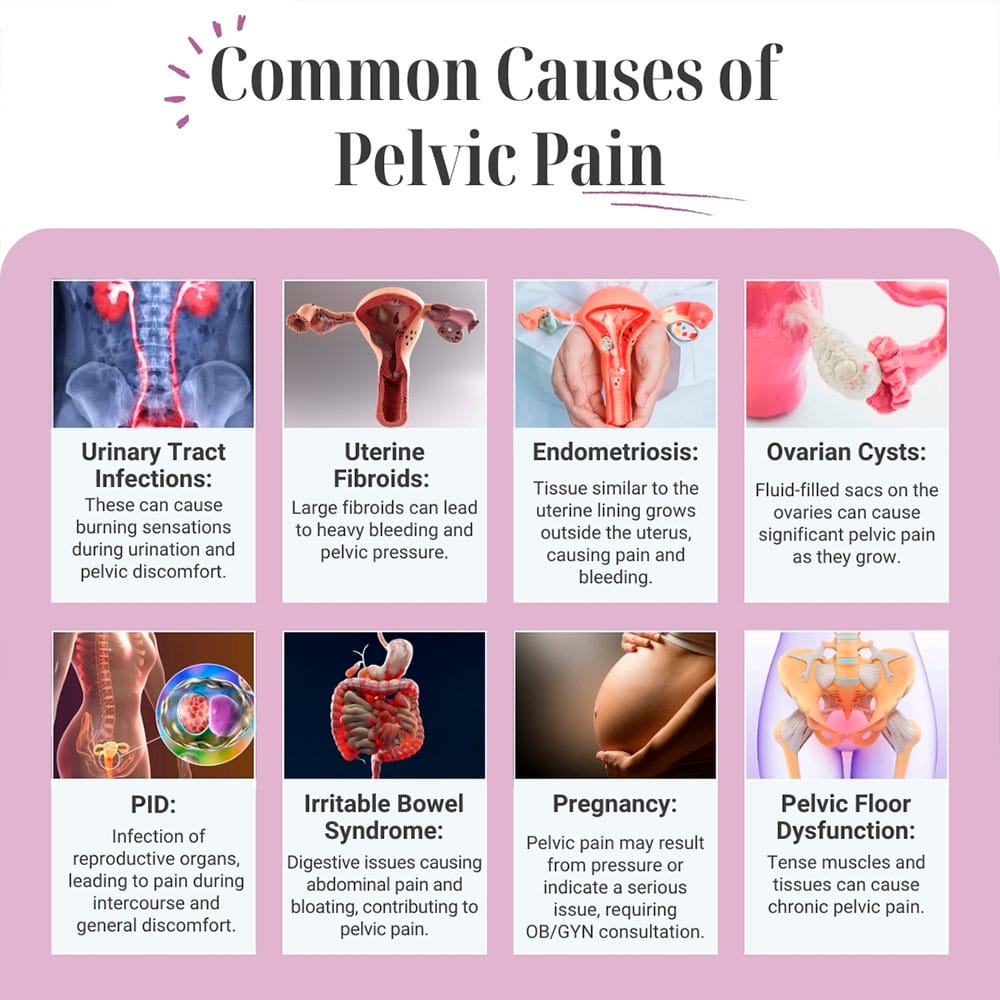What Is Pelvic Pain?
 Pelvic pain is a symptom, not a disease. It can come on suddenly or persist for months. This pain occurs in your lower abdomen, between your hips and below your belly button. It affects both men and women; however, lower left abdominal pain in women is more common due to the presence of reproductive organs in the pelvic region. A sharp pain in vaginal areas may have various causes, depending on your overall health.
Pelvic pain is a symptom, not a disease. It can come on suddenly or persist for months. This pain occurs in your lower abdomen, between your hips and below your belly button. It affects both men and women; however, lower left abdominal pain in women is more common due to the presence of reproductive organs in the pelvic region. A sharp pain in vaginal areas may have various causes, depending on your overall health.
Whether you’re dealing with pelvic pain during pregnancy, pubic bone pain or chronic pelvic pain syndrome, Dr. Felix Cohen, founder and director at Cohen Medical Practice (CMP) in New York, is equipped to address the causes of pelvic pain and devise the appropriate treatment plan.
What Causes Pelvic Pain?
Urinary tract infections can affect your bladder, urethra or kidneys, which causes burning sensations when you urinate, as well as pelvic pain. If there are growing uterine fibroids in your uterus, they can lead to pelvic pain if they’re large or pressing on other organs. You may notice symptoms like heavy menstrual bleeding, prolonged periods and pelvic pressure.
Other common reasons for pelvic pain include:
- Endometriosis. This can cause discomfort as tissue similar to the lining of your uterus grows outside it and presses on nearby organs, causing excessive bleeding and pressure.
- Ovarian cysts. These are fluid-filled sacs that develop on your ovaries, which, as they grow, cause disruptive pelvic pain.
- Pelvic inflammatory disease. This infection of the reproductive organs typically is caused by sexually transmitted infections and can lead to pelvic pain during sex.
- Irritable bowel syndrome. Digestive disorders that lead to symptoms like abdominal pain, bloating and changes in bowel habits can also cause pelvic pain.
- Pregnancy. Pelvic pain during pregnancy may just be the result of pressure on your pelvis area that you aren’t accustomed to, or a sign of something more serious, which is why it’s vital that you tell your OB/GYN about it immediately.
Additionally, the muscles and tissues that support your pelvic organs might be overly tense if you have pelvic floor dysfunction. This also results in chronic pelvic pain syndrome, difficulty with bowel movements and pelvic pain during sex.

When Should I See a Doctor for Pelvic Pain?
 If your pelvic pain comes with symptoms like unusually heavy menstrual bleeding or abnormal bleeding between periods, you must pay attention to it. Unexplained pain can also be a symptom of various conditions, including gynecological or gastrointestinal disorders. Persistent nausea or vomiting combined with pelvic pain could be a sign of a gastrointestinal problem that requires professional treatment.
If your pelvic pain comes with symptoms like unusually heavy menstrual bleeding or abnormal bleeding between periods, you must pay attention to it. Unexplained pain can also be a symptom of various conditions, including gynecological or gastrointestinal disorders. Persistent nausea or vomiting combined with pelvic pain could be a sign of a gastrointestinal problem that requires professional treatment.
Other symptoms that warrant an immediate visit to your CMP physician include:
- When pelvic pain starts interfering with your ability to work and disrupts your routine and your activities of daily living
- Experiencing pelvic pain after an injury or trauma, such as a fall or accident
- Sudden pain that could be caused by serious conditions such as a ruptured ovarian cyst or appendicitis
Pelvic pain that gets worse over time and doesn’t improve with rest and over-the-counter remedies may be a sign of more serious issues for which you shouldn’t wait. Visit CMP as soon as possible.
How Is Pelvic Pain Diagnosed?
Your NYC doctor asks about your medical history and details about your pelvic pain. The more information you can provide, the easier it is for your doctor to pinpoint possible causes of your pain. During a pelvic exam, your doctor looks for signs of tenderness, swelling or other abnormalities.
This involves checking the outer pelvic area for any signs of infection, using a speculum to view your cervix and examining your rectal area for issues that could be contributing to your pain.
Other tests or procedures may include:
- Lab tests. Blood work and urine tests can help identify infections, inflammation or other issues affecting your health.
- Pelvic ultrasound. Using sound waves to examine your pelvic organs can detect things like fibroids or cysts.
- Pelvic laparoscopy. This is a minor, minimally invasive surgery during which your doctor inserts a small camera through a tiny incision below your belly button to get a clear view of your pelvic area.
Your doctor follows a detailed process to uncover the root cause of your pelvic cramps. Your doctor may also perform imaging tests like a pelvic MRI, which use magnets and radio waves to give your doctor clear, detailed pictures of your pelvic organs.
How Is Pelvic Pain Treated?
Treatment for pelvic pain depends on the cause of the problem. Your doctor may prescribe medications like pain relievers, antibiotics or hormonal treatments. If your pelvic pain is caused by muscle issues, pelvic floor physical therapy can be an effective solution. Pessaries may be recommended if your pain is related to pelvic prolapse. Sometimes, simple lifestyle changes can have a big impact on managing pelvic pain, such as dietary adjustments, stress management or regular physical activity.
If your condition requires surgical treatment, the procedures available to you include:
- Hysteroscopy
- Myomectomy or Hysterectomy
- Nerve block injections
CMP New York specializes in feminine health and gynecological surgery. Whether your pain is mild or severe, Dr. Felix Cohen, a board-certified NYC gynecologist offers exceptional care and support for managing pelvic pain as well as full range of gynecological services. Contact Cohen Medical Practice (CMP), located in the heart of Midtown NYC, and schedule a consultation to get the care you deserve.

